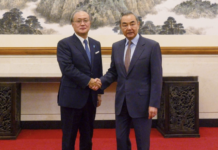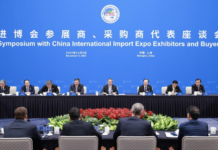Beijing, Dec 7 — Chinese State Councilor and Foreign Minister Wang Yi said on Monday it’s up to the U.S. to make the correct decision on the future of China-U.S. ties, and called on the two countries to resume dialogue at all levels.
“The top priority is that both sides should work together to remove all kinds of disruptions and obstacles and achieve a smooth transition in China-U.S. relations,” Wang said during a meeting with business leaders from the U.S.-China Business Council.
He added that China and the U.S. should work in a direction that serves the common interests of the two countries and peoples, so that the two sides can restart dialogue, rebuild mutual trust and get bilateral ties back on track.
“The serious difficulties encountered in Sino-U.S. relations in recent years are something we do not want to see, and I believe it is also something that all sectors of the U.S. community, including the business community, do not want to see,” Wang said.
China and the U.S. have different histories, cultures, social systems and development paths, but both sides share a wide range of common interests and room for broad cooperation, he pointed out.
As the world’s two largest economies, “China and the United States should strengthen dialogue and cooperation and make greater contributions to the lasting peace and prosperity of mankind,” Wang stressed.
Wang urged the U.S. to correct its strategic perceptions, while asserting that the root cause of the current state of bilateral relations is that some people on the U.S. side cling to the ideological prejudice and a continuation of a Cold War mentality. This has led to a “zero-sum-game” view that China is an adversary.
Wang expressed hope that the U.S.’ policy on China can return to objectivity and rationality as soon as possible.
In the face of major global challenges, such as the spread of COVID-19 and economic recession, China and the United States should help each other in the same boat and show responsibility, he noted
“China does not interfere in the internal affairs of the United States, does not export its development model abroad, and does not engage in ideological confrontation; the United States should also abide by the norms of international relations, not interfere in China’s internal affairs, and not block the Chinese people’s right to pursue a better life,” Wang stressed.
Speaking of bilateral trade ties, Wang said economic and trade cooperation has always been a key part of the China-U.S. relationship, while the U.S. business community has been a stabilizing force in promoting the healthy development of the relationship.
“In the face of the current challenges, we hope that the U.S.-China Business Council and the U.S. business community will continue to play their due roles and make positive contributions to bring China-U.S. ties to the right path of development,” he added.
















